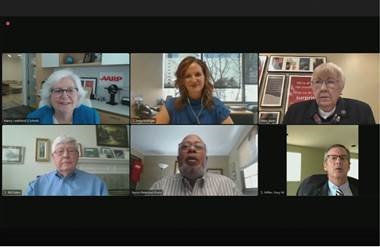AARP Hearing Center


As part of our ongoing fraud prevention work, AARP has collaborated with the U.S. Securities and Exchange Commission (SEC) on a series of events designed to spotlight the growing problem of investor fraud and help older investors and family caregivers spot and avoid financial scams.
For the second event in the series, I moderated a panel for the SEC’s “Older Investor Roundtable,” which featured a discussion on fraud, financial planning, and the challenges faced by older investors and their caregivers.
Before sharing highlights from the session, I want to thank the SEC, Chair Gensler, Commissioner Peirce, Commissioner Crenshaw, and the North American Securities Administrators Association (NASAA) for putting on this tremendous event and continuing to serve as critical partners to AARP in our effort to educate, support, and advocate on behalf of our members and consumers. This event highlighted the lived experiences of older investors, and I am thankful to the SEC for recognizing the importance of elevating their voices.
As I said during the session, every year millions of Americans lose BILLIONS of dollars to fraud. Scammers target the young and old alike, but when older adults fall victim to financial crimes, they often have more to lose given their decades of hard work and savings. And while the financial toll is immense, the emotional aspect is equally as profound, for the individual the crime was perpetrated against, as well as their caregivers and loved ones. That’s why it’s so important that we work to arm our constituency with the knowledge to spot and avoid scams, and to help raise awareness on the growing issue of investor fraud.
Panel 1: Impact of Fraud and Fraud Prevention
Let me share some key themes and helpful tips from panelists Amy Nofziger, Mary Bach, and Byron Peterson.
1. Create Barriers of Entry
As Amy Nofziger, AARP’s director of fraud victim support, said, “none of us ever thinks this will happen to us,” and so “people don’t pay attention to education on a topic that they don’t think will happen to them.” As a result, we need more proactive measures to stop the crimes before they happen. Amy noted that restrictions are more likely to exist for other types of products, but less so in the financial and technological arenas. For example, when you go into a hardware store, you have to ask a clerk to unlock the spray paint from the cabinet, but you could walk up to a cryptocurrency machine at your local gas station or purchase thousands of dollars worth of gift cards without any barrier. More restrictive rules around point of entry, especially associated with gift cards and cryptocurrency, would go a long way towards stopping the crimes and criminals before it’s too late and the money is gone.
2. Never feel pressured to rush into an “opportunity”
Mary Bach is an AARP fraud fighter volunteer and the chair of AARP Pennsylvania’s Consumer Issues Task Force. She also moonlights as an undercover “senior sleuth” at investment planning seminars to get the inside scoop on ‘opportunities’ that are too good to be true. Attending more than 35 events, Mary and her husband have had several eye-opening red flag experiences, including generalized pitches with vague charts and percentages, exaggerated claims of no risk and guaranteed returns, and representatives with fake credentials, including “CSS- Certified Senior Specialist" and “CHSG-Certified High School Graduate.” She was even once told: “you write me a check for $100,000, and we’ll work out the details later.” As Mary said, “it may take only one bad investment and uninformed decision to wipe out your life savings.” That’s why it’s critical to do your homework on the investment opportunity and never feel pressured to rush into a deal.

































































Recommended for You